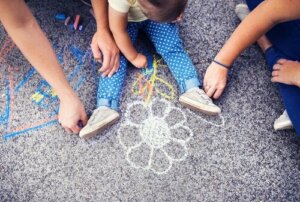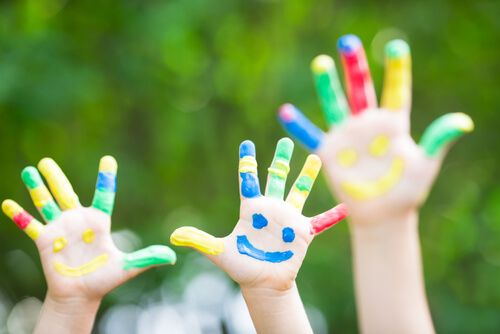19 Tips From Maria Montessori to Educate Your Children

“The child, with their enormous physical and intellectual potential, is a miracle in front of us”. This quote conceptualizes the famous Italian pedagogue Maria Montessori, who renewed the pedagogical methods of the early twentieth century. Here, we’ll show you some tips from Maria Montessori, whose theory seems like a spiritual concept because they have the quality of being simple and deep at the same time: Teach by example.
The Montessori philosophy suggests that the role of the adult is to guide the child and allow them to live in a good and comfortable environment. Therefore, through their role, they must be observers of both children and the environment in which they develop.
In addition, this method invites you to immerse yourself in a continuous process of learning and personal development.
“The true educator is at the service of the child and must cultivate in them humility, responsibility, and love,” says the humanist who based her ideas on respect for infants and their impressive ability to learn.

Parenting with respect
To put into practice the advice of the educator, who was also nominated three times for the Nobel Peace Prize, we need to transform ourselves, as only in this way can we prepare children for life. This is a process that involves spending time with them, getting along with children, enjoying teaching them, and giving them freedom.
“Allow your children to make mistakes and don’t solve things for them that they can do for themselves; when you do, you stunt their growth. Every time they’re faced with a new activity, let them try it alone. If you find that they still don’t have enough tools for it, show them how to do it and let them try one more time. Any unnecessary help is an obstacle to development,” Montessori advises.
Think a minute: In order to be happy, we need to develop, invent, create, dream, and live. Take advantage of the fact that we live in a great time, with the world within the reach of a click. And you also have at your disposal a childhood method of moral and mental freedom. So, with this in mind, take a look at the following tips from Maria Montessori.

Essential tips from Maria Montessori
- Children learn from their surroundings.
- If you criticize a child a lot, they’ll learn to judge.
- When you regularly praise your child, they’ll learn to value.
- If you show them hostility, they’ll learn to fight.
- If you’re fair, they’ll learn to be fair.
- Children become she when they suffer from frequent ridicule.
- If you grow up feeling secure, you’ll learn to trust others.
- If children are frequently put down, an unhealthy feeling of guilt will develop in them.
- By accepting your child’s ideas regularly, you’ll teach them to feel good about themselves.
- If you’re patient with them, they’ll learn to be patient.
- If you encourage children in what they do, they’ll gain self-confidence.
- When kids live in a friendly atmosphere and feel needed, they learn to find love in the world.
- Don’t speak ill of your children, whether they’re around or not.
- Focus on developing the good in the child so that there’s simply no room for the bad.
- Always listen to your child and respond to them when they approach you with a question or comment.
- Respect your child even if they made a mistake. They’ll get it right sooner or later.
- Be willing to help if your child is looking for something, but also be willing to go unnoticed if they already found what they were looking for.
- Helps children to assimilate what they weren’t able to assimilate before. Do that by filling the world around them with care, discretion, timely silence, and love.
- When you address your child, always do it in the best way. Give the best that is in you!
“The child, with their enormous physical and intellectual potential, is a miracle in front of us”. This quote conceptualizes the famous Italian pedagogue Maria Montessori, who renewed the pedagogical methods of the early twentieth century. Here, we’ll show you some tips from Maria Montessori, whose theory seems like a spiritual concept because they have the quality of being simple and deep at the same time: Teach by example.
The Montessori philosophy suggests that the role of the adult is to guide the child and allow them to live in a good and comfortable environment. Therefore, through their role, they must be observers of both children and the environment in which they develop.
In addition, this method invites you to immerse yourself in a continuous process of learning and personal development.
“The true educator is at the service of the child and must cultivate in them humility, responsibility, and love,” says the humanist who based her ideas on respect for infants and their impressive ability to learn.

Parenting with respect
To put into practice the advice of the educator, who was also nominated three times for the Nobel Peace Prize, we need to transform ourselves, as only in this way can we prepare children for life. This is a process that involves spending time with them, getting along with children, enjoying teaching them, and giving them freedom.
“Allow your children to make mistakes and don’t solve things for them that they can do for themselves; when you do, you stunt their growth. Every time they’re faced with a new activity, let them try it alone. If you find that they still don’t have enough tools for it, show them how to do it and let them try one more time. Any unnecessary help is an obstacle to development,” Montessori advises.
Think a minute: In order to be happy, we need to develop, invent, create, dream, and live. Take advantage of the fact that we live in a great time, with the world within the reach of a click. And you also have at your disposal a childhood method of moral and mental freedom. So, with this in mind, take a look at the following tips from Maria Montessori.

Essential tips from Maria Montessori
- Children learn from their surroundings.
- If you criticize a child a lot, they’ll learn to judge.
- When you regularly praise your child, they’ll learn to value.
- If you show them hostility, they’ll learn to fight.
- If you’re fair, they’ll learn to be fair.
- Children become she when they suffer from frequent ridicule.
- If you grow up feeling secure, you’ll learn to trust others.
- If children are frequently put down, an unhealthy feeling of guilt will develop in them.
- By accepting your child’s ideas regularly, you’ll teach them to feel good about themselves.
- If you’re patient with them, they’ll learn to be patient.
- If you encourage children in what they do, they’ll gain self-confidence.
- When kids live in a friendly atmosphere and feel needed, they learn to find love in the world.
- Don’t speak ill of your children, whether they’re around or not.
- Focus on developing the good in the child so that there’s simply no room for the bad.
- Always listen to your child and respond to them when they approach you with a question or comment.
- Respect your child even if they made a mistake. They’ll get it right sooner or later.
- Be willing to help if your child is looking for something, but also be willing to go unnoticed if they already found what they were looking for.
- Helps children to assimilate what they weren’t able to assimilate before. Do that by filling the world around them with care, discretion, timely silence, and love.
- When you address your child, always do it in the best way. Give the best that is in you!
All cited sources were thoroughly reviewed by our team to ensure their quality, reliability, currency, and validity. The bibliography of this article was considered reliable and of academic or scientific accuracy.
- Campos, O., & Claudia, R. (2003). Método Montessori. Psicopedagogía II Semestre.
- Febres-Cordero Intriago, I. M. (2014). La importancia de promover la autonomía en niños de cero a cinco años(Bachelor’s thesis, Quito, 2014). http://repositorio.usfq.edu.ec/handle/23000/3152
- Hainstock, E. (2013). Teaching Montessori in the home: The Pre-School years.Toronto: Random House.
- Montessori, M. (2013). Metode Montessori. Jogjakarta: Pustaka Pelajar.
- Pitamic, M. (2004). Teach me to do it myself: Montessori activities for you and your child. New York: Barron ́s Educational Series, Inc.
- Seldin, T. & Epstein, P. (2003). The Montessori way. Florida: Todd Allen Printing Co.Inc.
- Valdebenito, P. E., Profesora, V., Claudia, I. :, Bocaz, S., Campos, R., Ramo, O., & Loyola, : (2003). METODO MARIA MONTESSORI. Instituto Profesional Luis Galdames.
This text is provided for informational purposes only and does not replace consultation with a professional. If in doubt, consult your specialist.








